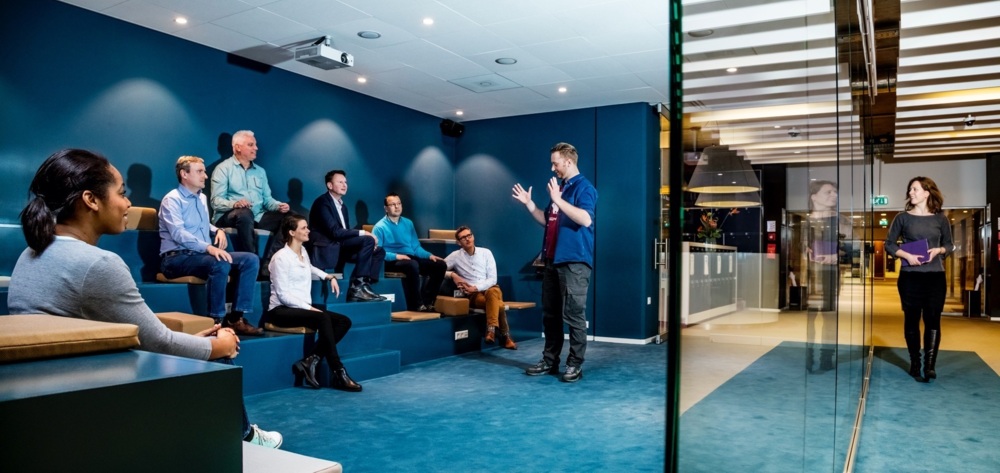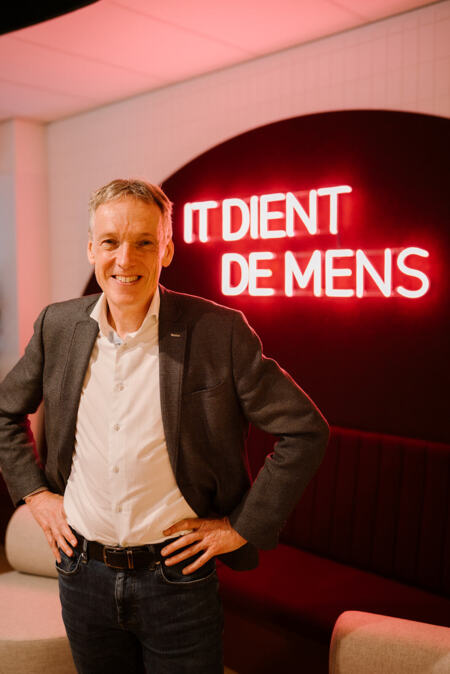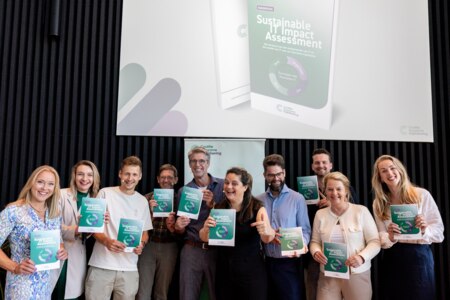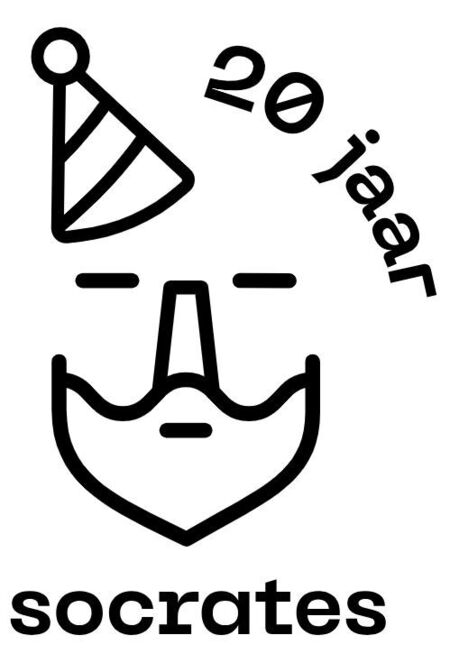
Read the full story by Microsoft: "How a public-sector organization is modernizing critical services with cloud technology".
Source: this article was written by Microsoft and published on their customer portal. A Dutch translation can be found below the English article (U vindt een Nederlandse vertaling van dit artikel onder de Engelse tekst).
Wigo4it: how a public-sector organization is modernizing critical services with cloud technology.
As the organization responsible for providing IT services to the four largest municipalities in the Netherlands, Wigo4it is committed to putting citizens’ needs at the heart of all it does. As part of this mission, the organization is currently undergoing a digital transformation journey aimed at adding more value for money, optimizing operations and helping its civil servants to support vulnerable citizens. Powered by the Microsoft Azure cloud, the initiative has triggered a shift in Wigo4it’s working culture, empowering its employees to achieve more.
“Many think that moving to the cloud just means getting rid of the data center. But it’s really so much more than that. It’s a complete transformation – different platform, different infrastructure, different mindset, different way of working.”
Pascal Greuter, ad interim Director of Operations at Wigo4it, is describing his company’s ongoing shift to the cloud and the extraordinary impact this is having on the society it serves.
“Our work revolves around providing social security to those qualifying for social welfare benefits,” he says. “Through our IT system and services, we bring vital support to citizens and households across some of The Netherlands’ most populated cities.”
It’s a mission that Wigo4it strives to promote using the latest technology available. One that recently culminated in an organization-wide program of cloud adoption and digital transformation that continues to this day.
Dubbed ‘better, faster, cheaper,’ the initiative is helping Wigo4it to automate processes, bring more value in less time and improve efficiency. Ultimately bringing better, more effective support to the members of society who require it the most.
“What I love about this initiative is that it’s all about giving time back to our civil servants,” he says.
“Time to focus on the complex tasks of their work; time not spent on admin; time to help the most vulnerable, most in-need parts of our society.”
External pressures lead to a new opportunity
Founded in 2007, Wigo4it was jointly created by the cities of The Hague, Amsterdam, Rotterdam and Utrecht with the aim of promoting knowledge-sharing and efficiency in the realm of IT solutions.
“The idea behind Wigo4it is that the four municipalities tend to face common challenges and have similar requirements when it comes to technology,” explains Rene van Osnabrugge, ad interim CTO at Wigo4it and DevOps consultant at Xpirit, a Microsoft partner that supported Wigo4it’s digital transformation. “That’s why fifteen years ago, they decided to join their forces and create the IT system Socrates.”
Nearly two decades later, Socrates is now one of the top three IT systems in the Netherlands, providing benefits to 144,000 vulnerable citizens – which equals nearly a third of all welfare recipients in The Netherlands. It currently handles more than €1.8bn per year and a network of 7,500 system users.
An organization in constant evolution and expansion, Wigo4it reached a turning point in 2019, when the four municipalities approached them with fresh new demands.
“They asked us to substantially reduce our budget and cut costs in four years,” he says. “Based on research, they decided that more could be done to improve the quality of our IT code and make our solution more future proof.
“Driven by our own ambitions to become a more professional and modern organization, we needed to deliver more value for money and become more product-focused – rather than just a shared service center extension of the municipalities’ IT departments.”
Embracing Microsoft and the cloud
As they searched for a solution that would best fit their needs, Wigo4it knew the importance of delivering high-quality services available to everyone. “We have an enormous responsibility to deliver flawless welfare payments,” says Pascal Greuter. “Even the smallest mistake has the potential to attract negative media exposure and impact our services.”
With public sector organizations increasingly replacing their on-premises data centers with cloud-based alternatives, Wigo4it saw this as the ideal opportunity to follow a similar path.
“We envisioned the cloud as much more than just a means to cut down budget,” says Rene van Osnabrugge. “It was the perfect way to automate our operations, become more secure and predictable, and ultimately more efficient.”
“And Microsoft Azure offered us great performance increases at a great price.”
That was the start of a partnership that Dian van Heijningen, PO at Wigo4it’s Cloud Enablement team, says has been crucial to the success of the project.
“Microsoft gave us some incredible support from the early days of our collaboration,” he says. “Not only did they help us get proficient on key products – such as Networking, Sentinel, Identity Governance, Monitoring & Alerting – they were also very fast and professional in addressing all our queries.”
He highlights how their collaboration quickly evolved from traditional vendor-user to a more dynamic partnership aimed at mutual support. “We would sometimes come up with questions or ideas that Microsoft had not yet thought about,” he says. “This is how we worked together to overcome challenges along the entire way.”
A monumental transition
Over the past three years, Wigo4it and Xpirit have been creating a new cloud environment, running on Azure Kubernetes Services, to replace the data center. They are currently focusing on the next phase of the project, which entails re-building a host of Socrates applications in the new environment.
Alongside this, the company is also moving towards a Software-as-a-Service environment that’s allowing them to use Office 365 and Azure Virtual Desktop in the workplace.
“One of the fundamental things that we want to put in place is self-service,” explains van Osnabrugge.
“Previous to our digital transformation, every single request around use and development of applications would be sent to us – from all four municipalities. That meant a lot of manual handling and, as a result, time and money.
“In this new environment, we want to transform that part of our work into a self-service portal where individual employees are responsible for their own requests.”
On top of that, Xpirit is also helping Wigo4it to build a compliancy dashboard that will soon allow teams to have access and insights into their operations and reduce manual checks.
Finally, a second self-service portal is also currently in the pipeline. This is going to be destined for the end customers and will be aimed at automating various functionalities.
Building a DevOps culture
Migrating to the cloud isn’t just a matter of budget management for Wigo4it. By embracing a new, more agile approach, the organization is promoting a DevOps culture aimed at encouraging employees to take greater ownership of their work.
“Prior to our shift, we were a very siloed organization when it came to our working culture,” says Pascal Greuter. “We needed to ask permission before doing anything.
“But since then, we’ve been persuading our employees to take more responsibility when it comes to innovation.”
He says that switching to the cloud was crucial in triggering that cultural shift. “Moving to a new testing environment – one that allows us to try out new features and develop software on top of them – has been transformational for us,” he continues.
“And cloud infrastructure makes that possible, freeing us of hardware and giving us the power to innovate.”
It’s a sentiment that Wigo4it wants to communicate across all branches of its operations – especially with the self-service portal becoming available.
“We are building this portal in a way that allows municipalities to develop more functionalities on top of it,” he explains. “All without depending on us.”
Creating the blueprint for more, greater benefits
Having now completed the bulk of the work, Wigo4it is looking at the future.
“When all of this began, the goal was to be better, faster and cheaper,” says Greuter.
“This is something we’ve already started to see: being on the cloud gives us insights on our costs, makes us flexible and scalable, and it is working as an accelerator for innovation across the entire organization.”
Now Wigo4it hopes to extend its services beyond the four municipalities – and branching out to other locations in the Netherlands. “One of my greatest frustrations is that we are offering our solutions to only four cities in the Netherlands,” he concludes.
“There are some 350 municipalities that we can provide this solution to, and we hope that in the future, many will want to join in.
“Ultimately embracing that company-wide transformation that being on the cloud empowers you to achieve.”
Wigo4it de cloud in, het hele verhaal
Wigo4it: hoe een overheidsorganisatie essentiële diensten met cloudtechnologie moderniseert.
Als het bedrijf dat IT-diensten levert aan de vier grootste gemeenten van Nederland zorgt Wigo4it dat wat de burger nodig heeft altijd de kern van haar activiteiten is. Als onderdeel van deze missie ondergaat de organisatie momenteel een digitale transformatie die is gericht op het toevoegen van meer value for money en haar ambtenaren helpen meer kwetsbare burgers te ondersteunen. Aangedreven door de Microsoft Azure Cloud heeft het initiatief een verschuiving in Wigo4it’s werkcultuur getriggerd, waardoor haar werknemers meer kunnen bereiken.
“Men denkt dat naar de cloud overstappen alleen maar afscheid nemen van het datacenter betekent, maar het is zo veel meer. Het is een complete transformatie – ander platform, andere infrastructuur, andere mindset, andere werkwijze.”
Pascal Greuter, interim Algemeen Directeur van Wigo4it beschrijft de voortdurende verschuiving naar de cloud van zijn organisatie en de buitengewone impact hiervan op de maatschappij die zij dient.
“Ons werk draait om het bieden van sociale zekerheid aan mensen die in aanmerking komen voor bijstandsuitkeringen,” zegt hij. “Met ons IT-systeem en diensten bieden we ondersteuning die van vitaal belang is voor burgers en huishoudens in een aantal van de dichtstbevolkte steden van Nederland.”
Het is een missie die Wigo4it wil bevorderen door middel van het inzetten van de allernieuwste technologie. Een missie met als recent hoogtepunt een organisatiebreed programma van cloud-adoptie en digitale transformatie dat nu nog voortduurt.
Het initiatief dat ‘beter, sneller, goedkoper’ is genoemd helpt Wigo4it processen te automatiseren, meer waarde in minder tijd te bieden en de efficiëntie te verbeteren. Zo wordt er uiteindelijk betere, effectievere steun geboden aan de leden van de samenleving die deze het hardst nodig hebben.
“Wat ik zo mooi vind aan dit initiatief is dat het volledig draait om tijd teruggeven aan onze ambtenaren,” zegt hij.
“Tijd om te focussen op de complexe taken die bij hun werk horen, tijd die niet aan administratie wordt besteed, tijd om de meest kwetsbare en noodlijdende delen van onze samenleving te helpen,” zegt hij.
Externe druk leidt tot een nieuwe kans
Wigo4it is in 2007 gezamenlijk opgericht door de gemeenten Den Haag, Amsterdam, Rotterdam en Utrecht met als doel het bevorderen van kennis delen en efficiëntie in het domein van IT-oplossingen.
“Het idee achter Wigo4it is dat de vier gemeenten vaak tegen dezelfde problemen aanlopen en vergelijkbare eisen hebben wat betreft technologie,” legt Rene van Osnabrugge uit, interim-CTO bij Wigo4it en DevOps-consultant bij Xpirit, een Microsoft-partner die Wigo4it’s digitale transformatie heeft ondersteund. “Daarom besloten ze vijftien jaar geleden de handen ineen te slaan en het IT-systeem Socrates te creëren.”
Bijna twee decennia later is Socrates één van de top drie IT-systemen in Nederland en verstrekt het uitkeringen aan 144.000 kwetsbare burgers – bijna een derde van alle bijstandsuitkeringen in Nederland. Op dit moment verwerkt het ruim 1,8 miljard euro, met een netwerk van 7500 systeemgebruikers.
Als een organisatie die voortdurend evolueert en uitbreidt, bereikte Wigo4it in 2019 een keerpunt toen de vier gemeenten haar met nieuwe eisen benaderden.
“Ze vroegen ons om in vier jaar tijd ons budget aanzienlijk te verkleinen en te bezuinigen,” zegt hij. “Ze hadden op basis van onderzoek besloten dat we meer konden doen om de kwaliteit van onze IT-code te verbeteren en onze oplossing meer futureproof te maken.”
“Gedreven door onze ambitie om een meer professionele en moderne organisatie te worden, moesten we meer value for money bieden en meer product-gefocust worden – in plaats van alleen een shared servicecentrum van de IT-afdelingen van de gemeenten.”
Microsoft en de cloud omarmen
In de zoektocht naar de best bij de eisen passende oplossingen was Wigo4it zich ervan bewust hoe belangrijk het leveren van kwaliteitsdiensten die voor iedereen beschikbaar zijn is. “We hebben een enorme verantwoordelijkheid om foutloze bijstandsuitkeringen te verstrekken,” zegt Pascal Greuter. “Een klein foutje kan al negatieve media-aandacht trekken en een impact op onze diensten hebben.”
Dat overheidsorganisaties hun lokale datacenters steeds meer vervingen door cloudbased alternatieven zag Wigo4it als de ideale kans om een vergelijkbaar pad te volgen.
“We zagen de cloud als veel meer dan een manier om ons budget te verkleinen,” zegt Rene van Osnabrugge. “Het was de perfecte manier om onze werkzaamheden te automatiseren, beter beveiligd en meer voorspelbaar te worden en uiteindelijk efficiënter.”
“En Microsoft Azure bood ons een mooie performanceverhoging tegen een mooie prijs.”
Dat was het begin van een samenwerking die volgens Dian van Heijningen, PO van Wigo4it’s Cloud Enablement Team, cruciaal was voor het slagen van het project.
“Microsoft ondersteunt ons sinds het begin van onze samenwerking ongelofelijk goed,” zegt hij. “Ze hebben ons niet alleen wegwijs gemaakt in belangrijke producten – zoals Networking, Sentinel, Identity Governance, Monitoring & Alerting – ze reageerden ook zeer snel en professioneel op onze vragen.”
Hij benadrukt hoe hun samenwerking al snel evolueerde van traditioneel vendor-user tot een meer dynamische samenwerking met als doel wederzijdse ondersteuning. “We bedachten af en toe vragen of ideeën waar Microsoft zelf nog niet aan had gedacht,” zegt hij. “Zo werkten we continu samen om problemen op te lossen.”
Een monumentale overgang
De afgelopen drie jaar hebben Wigo4it en Xpirit een nieuwe cloudomgeving gecreëerd die op Azure Kubernetes Services draait om het datacenter te vervangen. Op dit moment ligt de focus op de volgende fase van het project: een groot aantal Socrates-applicaties opnieuw bouwen in de nieuwe omgeving.
Daarnaast is de organisatie ook bezig met de overgang naar een Software-as-a-Service-omgeving waardoor Office 365 en Azure Virtual Desktop op de werkplek kunnen worden gebruikt.
“Eén van de fundamentele dingen die we willen realiseren is selfservice,” legt van Osnabrugge uit.
“Voor onze digitale transformatie werd elke vraag over gebruik en ontwikkeling van applicaties naar ons gestuurd – van alle vier de gemeenten. Dat betekende veel handwerk en, als gevolg daarvan, tijd en geld.”
“In deze nieuwe omgeving willen we dat deel van ons werk in een selfserviceportaal veranderen, waarin werknemers voor hun eigen vragen verantwoordelijk zijn.”
Daarbij helpt Xpirit Wigo4it met het bouwen van een compliancydashboard dat teams binnenkort toegang tot en inzicht in hun werkzaamheden biedt en handmatige controles vermindert.
Tenslotte staat er ook een tweede selfserviceportaal op stapel. Dit portaal is voor de eindgebruiker bestemd en zal gericht zijn op het automatiseren van diverse functionaliteiten.
Een DevOps-cultuur bouwen
Naar de cloud migreren is niet alleen een kwestie van budgetmanagement voor Wigo4it. Door een nieuwe, meer flexibele aanpak te omarmen, stimuleert de organisatie een DevOps-cultuur met als doel medewerkers motiveren om meer verantwoordelijkheid voor het eigen werk op zich te nemen.
“Voor onze omschakeling was er binnen onze organisatie veel silovorming, qua werkcultuur,” zegt Pascal Greuter. “We moesten voor elke handeling toestemming vragen.
“Maar sindsdien halen we onze werknemers over tot het nemen van meer eigen verantwoordelijkheid als het om innovatie gaat.”
Hij zegt dat naar de cloud overstappen cruciaal was bij het triggeren van die cultuurshift. “Naar een nieuwe testomgeving verhuizen – waarin we nieuwe features kunnen uitproberen en daarop nieuwe software kunnen ontwikkelen – was voor ons transformationeel,” gaat hij verder.
“Een cloudinfrastructuur maakt dat mogelijk, verlost ons van hardware en geeft ons de kracht om te innoveren.”
Die gedachte wil Wigo4it op alle takken van de organisatie overbrengen – zeker nu het selfserviceportaal binnenkort beschikbaar is.
“We bouwen dit portaal op zo’n manier dat gemeenten er meer functionaliteiten op kunnen bouwen,” legt hij uit. “En dat zonder van ons afhankelijk te zijn.”
De blauwdruk creëren voor meer, betere voordelen
Nu het leeuwendeel van het werk is afgerond, kijkt Wigo4it naar de toekomst.
“Toen dit allemaal begon, was het doel beter, sneller en goedkoper zijn,” zegt Greuter.
“Dit zien we nu al: in de cloud werken biedt ons inzicht in onze kosten, maakt ons flexibel en schaalbaar, en werkt als een versneller voor innovatie in de hele organisatie.”
Nu hoopt Wigo4it haar diensten buiten de vier gemeenten uit te breiden, naar andere locaties in Nederland. “Eén van mijn grootste frustraties is dat we onze oplossingen maar aan vier steden in Nederland leveren,” sluit hij af.
“Er zijn zo’n 350 gemeenten om deze oplossing aan te leveren en we hopen dat veel daarvan in de toekomst willen meedoen.”
“Om uiteindelijk die organisatiebrede transformatie te omarmen die door in de cloud werken mogelijk wordt gemaakt.”






